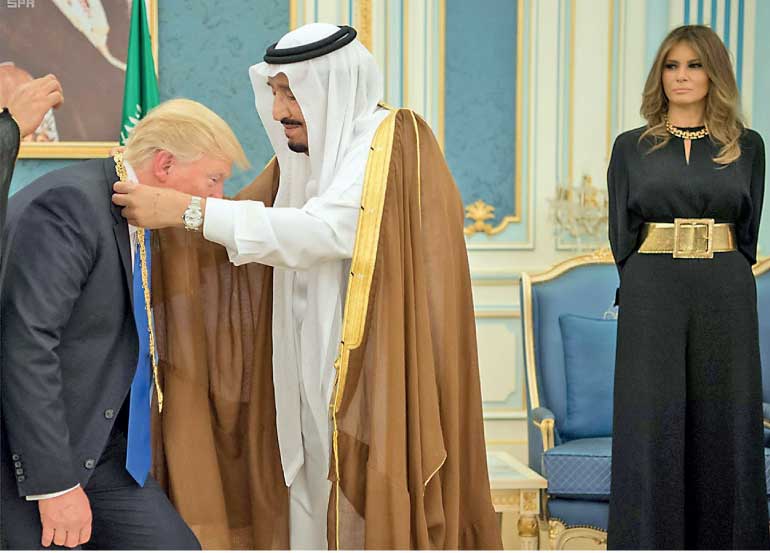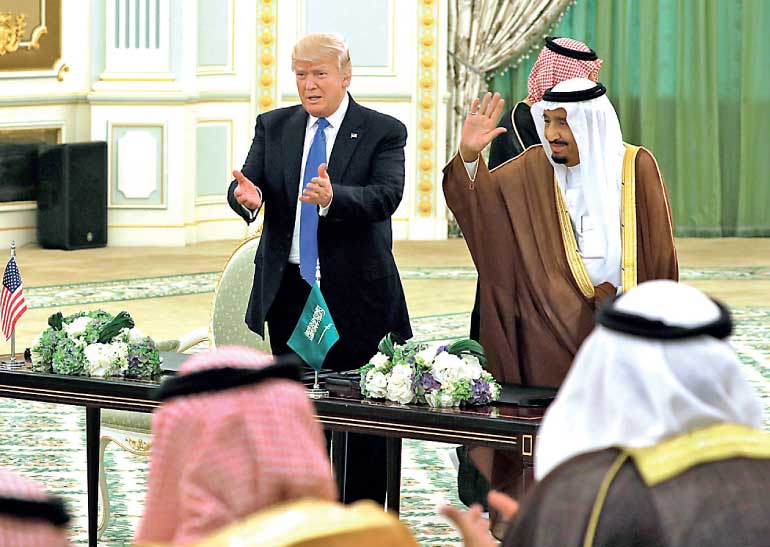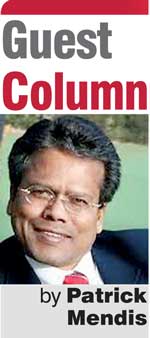Saturday Feb 14, 2026
Saturday Feb 14, 2026
Monday, 22 May 2017 00:01 - - {{hitsCtrl.values.hits}}

Saudi Arabia’s King Salman bin Abdulaziz Al Saud presents US President Donald Trump with the Collar of Abdulaziz Al Saud Medal as first lady Melania Trump watches, at the Royal Court in Riyadh, Saudi Arabia 20 May 2017 - Saudi Press Agency/Handout via Reuters
In parallel with President Richard Nixon’s trip to Saudi Arabia and other Middle East countries during the Watergate crisis almost 33 years ago, President Donald Trump, who is now swirling around a similar predicament at home, has embarked on his maiden 10-day overseas trip as the US’ chief diplomat, with Saudi Arabia his first stop. The choice of the Kingdom of Saudi Arabia not only undermines America’s democratic allies in Europe but also disregard the founding Jeffersonian values of the republic.
In all, the White House has now deliberately sent the wrong message of American values in religious freedom, democracy and liberty that will dent the United States’ moral vision and current standing in the world.
President Trump and his Secretary of State Rex Tillerson, as former businessmen, are transactional leaders. Prof. Joseph Nye at Harvard University writes: “Leadership experts and the public alike extol the virtues of transformational leaders—those who set out bold objectives and take risks to change the world. We tend to downplay ‘transactional’ leaders whose goals are more modest as mere managers.”
 Saudi Arabia’s King Salman bin Abdulaziz Al Saud presents US President Donald Trump with the Collar of Abdulaziz Al Saud Medal as first lady Melania Trump watches, at the Royal Court in Riyadh, Saudi Arabia 20 May 2017 - Saudi Press Agency/Handout via Reuters
Saudi Arabia’s King Salman bin Abdulaziz Al Saud presents US President Donald Trump with the Collar of Abdulaziz Al Saud Medal as first lady Melania Trump watches, at the Royal Court in Riyadh, Saudi Arabia 20 May 2017 - Saudi Press Agency/Handout via Reuters
The Trump White House with most political operatives as his brain trust are a hodgepodge of short-term tacticians neither fully immersed in American history nor international affairs. Their reactions to previous policies and American values appear to measure in pecuniary terms. However, the foundation of American primacy as an exceptional and indispensable nation in world affairs has derived from the reflective actions of ‘transformational’ leaders like Franklin Roosevelt, Harry Truman and Ronald Reagan.
Reflecting on media reports of the chaotic management issues in the White House and the State Department, Trump and Tillerson are being questioned about their abilities not only as leaders but as competent managers in complex organisations of the US Government where, as designed, no one possesses absolute power. Even though Secretary Tillerson acknowledged the Saudi human rights problem at a Congressional hearing, the White House’s selection of a Muslim kingdom is a myopic reaction to compensate for Trump’s anti-Islamic rhetoric and the disastrous immigration policy of banning citizens of Muslim countries other than Egypt, Turkey and Saudi Arabia—whose human rights violations have even intensified more recently. For many years, Saudi Arabia has widely been considered one of the worst human rights offenders in the world.
Arabia has widely been considered one of the worst human rights offenders in the world.
Given all this, why did the White House now choose the absolute monarchy in the Muslim world, whose strict Sharia law—or Islamic religious law—Trump repeatedly denounced as an antithesis of American values?
Trump in Kingdom’s hands
The Kingdom of Saudi Arabia, the world’s second largest oil producer after Russia and the largest oil exporter, is the financier and promoter of Salafism, a Sunni movement that advocates a return to the Islamic traditions of the Prophet Muhammad and his contemporaries. This and other forms of Wahhabism of Saudi’s Muslim faith are also being exported through the Madrassa school system, the fountainhead of Islamist terrorism around the globe.
Moreover, 15 of the 19 hijackers who destroyed the two towers of the World Trade Center and a portion of the Pentagon through the infamous 9/11 attacks in New York, Virginia, and Pennsylvania were citizens of Saudi Arabia. Since then, the 9/11 Commission established that the Saudi Government had been involved in the attacks masterminded by terrorist Osama bin Laden when he commanded al-Qaeda.
Trump called Saudi Arabia “the world’s biggest funder of terrorism. Saudi Arabia funnels our petro-dollars, our very own money, to fund the terrorists that seek to destroy our people while the Saudis rely on us to protect them.”
In the meantime, Secretary of State Rex Tillerson sent his ‘Country Reports on Human Rights Practices for 2016’ to Congress. Over the years, the Department of State has repeatedly documented human rights violations in the Kingdom of Saudi Arabia. Human Rights Watch also reports on continuous human rights abuses in recent months as the Saudi and coalition airstrikes killed more than 4,000 civilians in factories, warehouses and other protected sites in Yemen.
Furthermore, the Sunni kingdom neither tolerates religious worship by adherents of other faiths than Islam nor allows women to drive. Homosexuality is punishable by death by stoning. These Sharia laws are hostile to the most conservative views of Trump’s electoral base of the Christian right.
Freedoms through prosperity?
In his recent speech at the State Department, the former Exxon Mobil Chief Executive argued that American values must take a backseat while national security and commercial interests drive President Trump’s ‘America First’ strategy with economic prosperity. He maintains an American “foreign policy projected with a strong ability to enforce the protection of our freedoms with a strong military.”
For him, “we can only do that with economic prosperity” as the Saudis, Russians and Chinese do. This sort of economic determinism with assorted other elements of an ‘America First’ plan—like banning and deporting immigrants—is a dramatic departure from America’s Jeffersonian foreign policy tradition of championing founding values and protecting human rights for those who cannot defend themselves from tyranny.
Author of the bestselling ‘The Art of the Deal’, President Trump has thus far demonstrated that he is a transactional leader. When he first met with President Xi Jinping at his ‘Winter White House’ in Florida, the North Korean nuclear issue and bilateral trade concessions were purposefully linked to a possible deal. As the Trump family has ongoing commercial interests in China, a transactional business relationship seems to work well with Xi’s ‘China First’ strategy and the ‘America First’ plan to address economic and employment issues in both countries.
When it comes to Saudi Arabia, President Trump has also changed his rhetoric as he did with China. Trump said, “Saudi Arabia—and I get along great with all of them. They buy apartments from me. They spend $ 40 million, $ 50 million. Am I supposed to dislike them? I like them very much.”
His commercial intercourse with the Saudi royal family goes back to the 1990s when Saudi Prince Alwaleed bin Talal Alsaud helped “bail” him out when New York’s Plaza Hotel and his Atlantic City casinos were struggling.
Do Jeffersonian inspirations prevail?
Unlike Saudi Arabia, Russia and China, the United States was created by an enlightened band of founding fathers with a global vision for the new republic. Welcoming immigrants from every corner of the globe, America has become the world and the world is America. The Jeffersonian ideals that are embedded in the Statue of Liberty—a gift by the French—and Ellis Island in New York Harbor must be the bedrock of American foreign policy.
The Jeffersonian inspiration is indeed the invisible attraction—or the so-called ‘soft-power’ in diplomacy—that makes America stronger and more prosperous, not “a strong military” as Secretary of State Tillerson has argued.
The best and most logical rationale was put forward by President Trump’s Secretary of Defence James Mattis, who had insightfully remarked: “If you don’t fully fund the State Department, then I need to buy more ammunition ultimately.”
The deal-making, transactional Trump White House must not forget Thomas Jefferson, the first Secretary of State in the George Washington administration, whose iconic memorial on the south of the White House at the edge of Tidal Basin keeps watchful eyes on the chief diplomat in the Oval Office. Indifference to Jeffersonian values and American foreign policy tradition, which made America a great globally democratic nation, will have associated costs for the Trump presidency sooner or later.
(Dr. Patrick Mendis, a former US State Department official and NATO military professor, is an associate-in-research at the Fairbank Center for Chinese Studies at Harvard University and the author of several books, most recently ‘Peaceful War: How the Chinese Dream and American Destiny Create a Pacific New World Order’ (www.patrickmendis.com). A former AFS high school exchange scholar from Sri Lanka to the United States, Prof. Mendis is a first-class BSc. (Hons) graduate of the University of Sri Jayewardenepura).